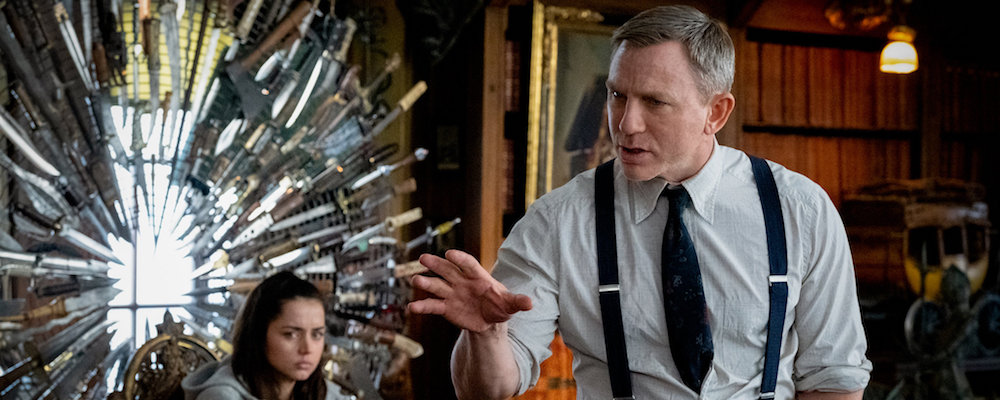‘Knives Out’ Might Be the Best Movie About Modern America This Year
Andrew Bundy
In a great mystery, the idea at the center of the whodunnit should hold more value than all the twisty surprises leading up to the inevitable reveal. In “Knives Out,” writer/director Rian Johnson’s caring and thoughtful creative follow-up to “Star Wars: The Last Jedi,” best-selling mystery author Harlan Thrombey’s (Christopher Plummer) mansion is described as a Clue board come to life. The overcrowded, artifact clutter of his estate and its expansive grounds contains a multitude of idols gnashing their teeth, statues in the form of aggressive animals that are but an empty luxury afforded to an artist of privilege. Almost every murder suspect in Johnson’s new film believes they are entitled to more resources than others simply because they were born into power and expect to inherit even more.
When Harlan Thrombey is found dead in his study the investigation initially seems to spell suicide. While every member of his immediate family has a clear motive for his murder, their allibis on the evening in question vehemently point to innocence. His youngest son, Walt (Michael Shannon), was just relieved of his duties running dad’s publishing house, the widow of his oldest son, Joni (Toni Collette), has been cut off from the Thrombey’s financial generosity, his eldest daughter, Linda (Jamie Lee Curtis), and her horn-tooting, Trump-supporting husband, Richard (Don Johnson), have long been hoping to inherit his Massachusetts home, and their son, “Ransom” (Chris Evans), Harlan’s favorite grandchild — who only makes “the help” call him by his real name — skips out on the funeral but is right on time when the probate lawyer arrives.
The final piece of the puzzle is Harlan’s nurse and caretaker, Marta (a star-making performance by Ana de Armas), who has become quite close with the Thrombeys, though they may not all feel the same way. One week after the patriarch’s death, renowned private investigator Benoit Blanc (Daniel Craig, with a priceless southern drawl) arrives on the scene, after receiving an anonymous envelope of cash, and starts interviewing the family of suspects, alongside a local detective (Lakeith Stanfield) and state trooper (Noah Segan). Blanc discovers that Marta has a “regurgitative reaction to mistruthing,” in other words, she feels like throwing up whenever a dishonest statement comes close to coming out of her mouth. Blanc recruits her as his sleuthing sidekick, seeing her to be an honest soul worthy of trust.
For obvious reasons, “Knives Out” is the kind of film audiences will want to know as little about as possible going in; although, what makes the movie stand-out as an accomplished work of entertainment is that its storytelling resonance is not dependent on shock value and dense plotting but ideological decency and common kindness. Johnson’s film is a movie very much of the now that is simultaneously timeless in its approach.
Anyone who has followed Johnson’s career since his debut film “Brick,” a hard-boiled high school noir inspired by the novels of Dashiell Hammett, will note that “Knives Out” is the idiosyncratic genre wizard’s most straightforward and stylistically muted artistic effort to date, which appears by design. With the freedom afforded to few artists on the planet, Johnson has crafted a cathartic movie-making experience about the responsibility of inheriting resources, using empathy to keep audiences on the edge of their seat. He’s purposefully produced a straightforward film reliant on sleight of hand, finding a way to wrap a universal statement about the dangers of our country’s present moment into nearly every ounce of its story fabric, taking part in as few unnecessary indulgences as possible. After being handed the keys to George Lucas’ kingdom, Johnson’s humble, creative energy continually reveals just how considerate and respectable of a filmmaker he truly is.
The cast is uniformly outstanding. Toni Colette and Don Johnson having the showiest supporting roles outside of Craig’s Benoit Blanc, whose verbose tendency to process his thoughts out loud only gets more scene chewy as the film goes on. Christopher Plummer may only be present in flashbacks (a tricky device the film utilizes effortlessly) but it’s a joy to watch him inhabit the Mr. Body role, a victim who could very well have plotted the movie about his own murder. But the picture belongs to Ana de Armas, who is set to play Marilyn Monroe in Andrew Dominick’s long-gestating project, “Blonde.” The emotional threading of the entire film rests on her sensitive performance and she carries the movie effortlessly, surrounded by an ensemble of irreplaceable acting icons.
With exceptions here and there, Johnson reigns in all the flashy, whip dolly flourishes that have come to define his trademark camera movement, using them to heighten the impact of emotional payoff, and certain sequences, much more selectively than in his previous movies. This may be a personal project in the mid-budget range, but Johnson also understands what a privilege this platform is, and he’s put the desires of the audience above his own. The term “killing your darlings” is often overused in artistic communities, but here it feels 100% apropos.
“Knives Out” is Rian Johnson’s most mature work as a storytelling magician and a model example of how to construct a politically meaningful text wrapped up in a book jacket of old-fashioned entertainment. It’s the kind of film Hollywood has almost seemed to have forgotten how to make and it might be the best movie about modern America that’s been made this year, masterfully enveloping a meaningful text with a stamp of creative humility in as an enjoyable manner as humanly possible.
“Knives Out” opens on Nov. 27 in theaters nationwide.

